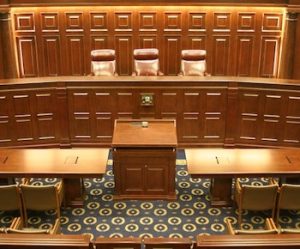 Bosch Auto. Serv. Sols., LLC v. Matal, No. 2015-1928, (Fed. Cir. Dec. 22, 2017) (Before Newman, Chen, and Hughes, J.) (Opinion for the court, Chen, J.)
Bosch Auto. Serv. Sols., LLC v. Matal, No. 2015-1928, (Fed. Cir. Dec. 22, 2017) (Before Newman, Chen, and Hughes, J.) (Opinion for the court, Chen, J.)
The Federal Circuit affirmed a Patent Trial and Appeal Board (“Board”) decision finding various claims of Bosch’s ‘796 patent as obvious over the prior art. However, the Court vacated and remanded the Board’s denial of Bosch’s motion to amend, which proposed substitute claims.
Bosch’s ‘796 patent related to a handheld tool for activating sensors for a tire pressure monitoring system, and communicating results to a vehicle’s monitoring system receiving unit. The challenged claims were brought before the Board when Autel U.S. Inc. and Autel Intelligent Technology Co., Ltd (collectively, “Autel”) requested an inter partes review.
The Board found the claims of the ‘796 patent to be obvious over the prior art. Bosch filed a contingent motion to amend its claims, if the original claims were found to be unpatentable. The motion proffered substitute claims, but the Board found those claims to be indefinite and unpatentable. The Board further found that Bosch failed to carry its burden of proof to show patentability of the substitute claims. Bosch appealed, and Autel did not participate in the appeal. Director Matal of the USPTO intervened, to defend the Board’s decision.
The Federal Circuit affirmed the Board’s findings that the claims of the ‘796 patent were obvious over the prior art. The Court agreed with the Board that there was motivation to combine the prior art, and that Bosch’s evidence to show non-obviousness, such as commercial success, licensing, and industry praise, was insufficient to reverse the Board’s findings.
However, due to the recent decision in Aqua Products v. Matal, 872 F.3d 1290 (Fed. Cir. 2017), the Court disagreed with the Board’s decision to deny Bosch’s motion to amend. The Board noted in its final decision that it was “unpersuaded that Bosch had demonstrated that the proposed substitute claims are patentable.” However, under Aqua Products, the patent owner does not bear the burden of proof for the patentability of its proposed amended claims in an IPR proceeding. Rather, the petitioner must prove by a preponderance of the evidence that the proposed amended claims are unpatentable. The Board therefore impermissibly assigned the burden of proof to Bosch. The Court vacated and remanded the Board’s denial of Bosch’s motion to amend.
Petitioner bears the burden of proving that Patent Owner’s substitute claims in an IPR are unpatentable; the Patent Owner does not have to prove its proposed claims are patentable.
[Troutman-Ad]
[Troutman-About]

![[IPWatchdog Logo]](https://ipwatchdog.com/wp-content/themes/IPWatchdog%20-%202023/assets/images/temp/logo-small@2x.png)


![[Advertisement]](https://ipwatchdog.com/wp-content/uploads/2024/04/Patent-Litigation-Masters-2024-sidebar-early-bird-ends-Apr-21-last-chance-700x500-1.jpg)

![[Advertisement]](https://ipwatchdog.com/wp-content/uploads/2021/12/WEBINAR-336-x-280-px.png)
![[Advertisement]](https://ipwatchdog.com/wp-content/uploads/2021/12/2021-Patent-Practice-on-Demand-recorded-Feb-2021-336-x-280.jpg)
![[Advertisement]](https://ipwatchdog.com/wp-content/uploads/2021/12/Ad-4-The-Invent-Patent-System™.png)







Join the Discussion
3 comments so far.
Lost In Norway
January 8, 2018 03:16 amThank you for the article. I have to wonder at what point does PTAB actually follow the courts? At what point does the assumption of a patent claim being valid actually happen?
Benny
January 6, 2018 03:38 pmJoachim,
I bet Anon could do 11, and render them unintelligable to the common man, too.
Simply providing substitute claims and holding on to your patent number impresses only the gullible. The idea is to obtain a substitue claim which your competitor still infringes, which is not so straightforward.
Joachim Martillo
January 6, 2018 09:13 amIn other words, proposing substitute claims provides a means preventing invalidation, upping a petitioner’s cost tremendously, and potentially negating any value of post-grant review proceedings to a petitioner.
It is helpful for the patent owner to have on his team someone like me, who suffers from logorrhea (it’s probably a form of OCD). As one of my prep school masters pointed out, I never use one word where I could use ten.
I can easily turn a single claim into ten substitute claims.